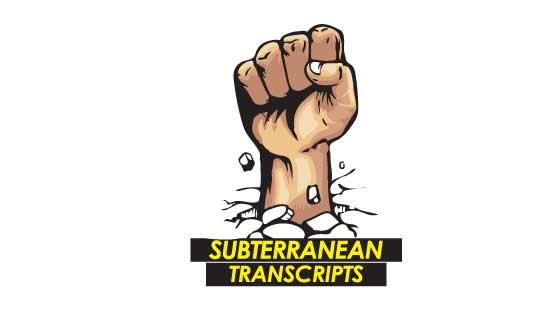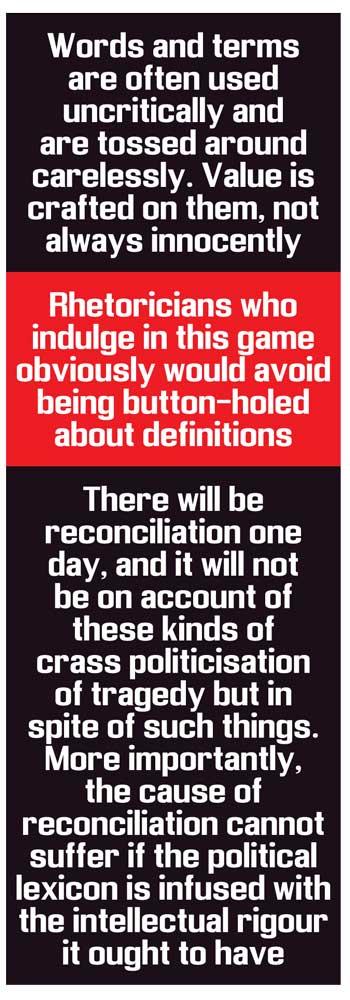Reply To:
Name - Reply Comment

‘Conflate’ is just one word that has been heard in the discourse on identity, identity politics, ethnicity and ethnic conflict. Let’s consider a few others
 At the Galle Literary Festival in 2008, I believe the late Sunila Abeysekera pleaded that ‘LTTE’ and ‘Tamil people’ not be conflated. She was pointing fingers at Sinhala nationalists. The following question was put to her: ‘Is there no conflation when the LTTE insists it is the sole representative of the Tamil people and others either agree or remain silent?’
At the Galle Literary Festival in 2008, I believe the late Sunila Abeysekera pleaded that ‘LTTE’ and ‘Tamil people’ not be conflated. She was pointing fingers at Sinhala nationalists. The following question was put to her: ‘Is there no conflation when the LTTE insists it is the sole representative of the Tamil people and others either agree or remain silent?’
Sunila, her ideological orientation and outcome preferences notwithstanding, could always be counted on for an honest answer. She said, ‘Yes, there is.’
Words and terms are often used uncritically and are tossed around carelessly. Value is crafted on them, not always innocently. Rhetoricians who indulge in this game obviously would avoid being button-holed about definitions. Interestingly, though, even academics, including those who teach and write about the politics of language go along with them. That’s political expediency and academic and intellectual dishonesty.
‘Conflate’ is just one word that has been heard in the discourse on identity, identity politics, ethnicity and ethnic conflict. Let’s consider a few others.
Peace
Now who on earth would proudly claim to be anti-peace? Even the worst warmongers and executors of terrible wars frequently claim that it’s all for peace. The word is used, but it is not unwrapped.
Peace, for some, could mean nothing less than a division of the country, while for others it would be a situation where such threats are non-existent.
Between these ‘non-negotiable’ are innumerable ‘peaces.’ We have seen ‘peace processes’ which are predicated on someone’s definition of peace. Those who took issue with such definitions were vilified as chauvinists, warmongers, or worse.
Border Villages
This was a commonly used term throughout the last two decades of the war. On the surface, ‘border’ could be taken as a reference to battle lines and areas of control. At a different level and as per its literal meaning, ‘border’ implies two distinct territories. Went well with the separatist rhetoric. ‘Threatened villages’ would have been better, but only if accompanied with necessary contextualisation.
North and South
This is similar to ‘border villages,’ but was liberally used in commentary and even in reportage, where scribes would insert at some point disclaimers along the following lines: ‘Tamils are mostly concentrated in the North while Sinhalese are mostly in the South.’ The words were used in other contexts too. It was a neat, clever and pernicious instrument because it presumes a territory cut in half, East-to-West. To an ignorant foreigner, say (and there were many who were lobbied and misled), the picture becomes stark: ‘A Sinhala government in control of a territory of which one half is occupied by a different ethnic group: how preposterous, how unfair!’
Multi-Ethnic, Multi-Religious. Yes, Sri Lanka is not a mono-ethnic, mono-religious polity (which country is?). I have yet to hear anyone using this formula speaking the numbers, the percentages. You could add history to it too if you like. And demographic data as well.
United
Google the ‘reconciliation (another word which we will come to) formulas’ of those who want a solution ‘this side of the division of the country into two separate states.’
This word features. Here’s the essence: ‘We want devolution of power (or ‘self-determination’) within a united Sri Lanka. United is not a term that can be legislated. It’s either unitary, federal, confederal or separate state. ‘United’ would be the odd one out. It’s a neat, clever and pernicious interjection of a patently non-political idea into a debate about specific legislative arrangements. It tickles the political term ‘unitary’ even as, in a formulaic sense, it subverts such an arrangement of the state.
Reconciliation
This is a bit like ‘peace.’ There’s an outcome preference that is taken as a non-negotiable. Acknowledgement of exclusive Tamil homelands for example and thereafter agreement to affirm the same through devolution of power (quasi-federal, federal, confederal or separate state) to territories that have been casually marked with no reference to history or demography.
Just the other day, I received an invitation to an art exhibition ‘to commemorate un-commemorative July 1983 to 2023.’ The artist who sent me the invite has not exactly ‘un-commemorated’ July 1983 (Black July to some Green-Black July to others).
My response: ’83 is quite the cash cow.’ It was a terrible, terrible crime, but no more terrible than other crimes which this particular artist has ‘un-commemorated’ since 1983 — the bheeshanaya of 88-89, the massacre of civilians by the LTTE in numbers exceeding those killed in July 1983 for example.
One does not justify the other. The blood of one does not wash away the blood of the other. Selective commemoration and selective use of the word ‘heinous,’ amounts to political duplicity and intellectual dishonesty. In this case, prostitution of art.
There will be reconciliation one day, and it will not be on account of these kinds of crass politicisation of tragedy but in spite of such things. More importantly, the cause of reconciliation cannot suffer if the political lexicon is infused with the intellectual rigour it ought to have. Activists, academics included, especially liberals, have demonstrated a marked aversion to engaging in such exercises. Their claims to radicalism, peace, reconciliation and such are therefore suspect.
[email protected]
www.malindawords.blogspot.com